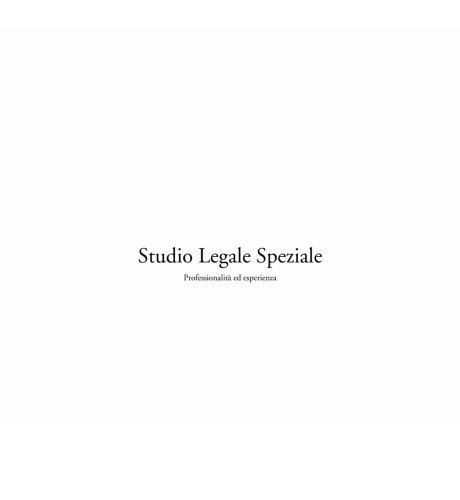Best Immigration Lawyers in Italy
Share your needs with us, get contacted by law firms.
Free. Takes 2 min.
Or refine your search by selecting a city:
List of the best lawyers in Italy
Italy Immigration Legal Questions answered by Lawyers
Browse our 5 legal questions about Immigration in Italy and read the lawyer answers, or ask your own questions for free.
- Visa renewal
- Hello sir I hove Italy 5 yers visa but it’s expired I apply for renewal at June still waiting not response can you help me to take soon Iam from Afghanistan
-
Lawyer answer by Avv Carlo Isnardi
Hi, I can have a look at it if you whish, sometimes the issue of the permit of stay exceed the normal time. I can only help you if you filed an application in Milan though
Read full answer - Parmisso di segirno
- Hello sir I need my renew my carta di segirno.plz help me..00393508691993. [email protected]
-
Lawyer answer by Boccadutri International Law Firm
Dear Sorya,Thank you for contacting our Law Firm. We can arrange a preliminary meeting with our Immigration legal adviser to understand better your case. The cost for our consultation will be 125.00 Euro plus CPA (a 4% Italian Law tax)...
Read full answer - Can I still renew my Stay Permit?
- I am a Master student of a 2 year program in University. But due to having part time job (within limited hours) I am planning to finish graduation within 2026. But I have found an information that, the stay permit for study perposes can only be renwed upto 3 years?... Read more →
-
Lawyer answer by MAH&CO.
Yes, it’s true that in many countries, a student residence permit for higher education is typically issued for the official duration of your academic program, with a maximum validity or renewal period (often up to three years). However, exceptions exist...
Read full answer
Italy Immigration Legal Articles
Browse our 2 legal articles about Immigration in Italy written by expert lawyers.
- Italy Digital Nomad Visa: Application Guide and 2026 Tax
- Italy's Digital Nomad Visa (launched 2024) targets highly skilled remote workers with foreign employers or clients, a clean criminal record, and annual income typically around EUR 28,000 or higher. The Digital Nomad route is outside the annual "decreto flussi" quota, while the classic Self-Employment Visa is quota-based, slower, and more... Read more →
- Italian citizenship via maternal line: Navigating 1948 Cases
- Italian citizenship by descent (jus sanguinis) is one of the most generous in the world, but cases through a female ancestor born before 1 January 1948 usually require a lawsuit in an Italian civil court, not a consulate application. The 1948 rule comes from old nationality rules that prevented Italian... Read more →
About Immigration Law in Italy
Immigration in Italy is governed by a combination of national laws, EU regulations, and international treaties. The primary focus of Italy's immigration law is on managing legal entry, residence permits, asylum applications, family reunification, and the integration of immigrants into society. Italy is a popular destination for migrants due to its cultural heritage, robust economy, and strategic location within Europe. Understanding Italy's immigration process requires familiarity with various visas, residence options, and citizenship pathways available to individuals seeking to live and work in the country.
Why You May Need a Lawyer
Immigration lawyers can be valuable in several situations due to the complexity and evolving nature of immigration laws and procedures in Italy. Some common scenarios where legal assistance may be necessary include:
- Visa Applications: Navigating the different types of visas and ensuring you meet the requirements.
- Residence Permits: Applying for temporary or permanent residency permits.
- Asylum and Refugee Status: Seeking asylum or securing refugee status in Italy.
- Family Reunification: Reuniting with family members legally residing in Italy.
- Work Permits: Obtaining employment authorization in Italy as a foreign national.
- Citizenship: Applying for Italian citizenship through various pathways such as descent, marriage, or residency.
- Legal Representation: In case of deportation proceedings or legal disputes related to immigration status.
Local Laws Overview
Italian immigration law is primarily governed by the Consolidated Act on Immigration (Legislative Decree No. 286/1998). Key aspects include:
- Visa Regulations: Defined categories for tourism, work, study, and family visas.
- Residence Permits: Temporary permits for specific cases and long-term EU residency permits.
- Asylum and Protection: Range of options including refugee status and subsidiary protection.
- Integration Policies: Programs aimed at helping immigrants integrate into Italian society.
- Citizenship Laws: Conditions under which foreign nationals can acquire Italian citizenship.
Frequently Asked Questions
What types of visas are available for Italy?
Italy offers various visa categories, including tourism, business, study, and work visas. Each has specific requirements relating to purpose, duration, and eligibility.
How can I apply for a residence permit in Italy?
You can apply for a residence permit (permesso di soggiorno) through the post office or at local police headquarters (Questura) within eight days of arrival in Italy.
What is required for family reunification in Italy?
Family reunification typically requires the foreign national to have a residence permit, sufficient income, and suitable housing to accommodate family members.
How can one obtain work authorization in Italy?
To work in Italy, a non-EU national must have a work permit obtained by a prospective employer through Italy's quota system for foreign workers (decreto flussi).
Can I study in Italy without a visa?
Non-EU nationals need a student visa to study in Italy. It's acquired before arrival, and valid enrollment in an Italian education institution is essential.
What are the steps to become a citizen of Italy?
Citizenship can be obtained through descent, marriage (after two years of marriage and residing), or naturalization after 10 years of residence.
What should I do if my visa is denied?
If your visa is denied, you can appeal the decision or reapply, addressing the issues that led to the initial denial.
Can refugees apply for asylum in Italy?
Yes, individuals can apply for asylum upon arrival or at the border in Italy. Procedures involve interviews and submission of relevant documents.
How does Italy handle deportation proceedings?
Deportation follows a legal process where individuals can appeal and must comply with removal orders if they lose the case.
What language proficiency is needed for immigration processes?
While not mandatory, proficiency in Italian can aid in navigating legal processes and integration into the community.
Additional Resources
For further information and assistance, consider these resources:
- Italian Ministry of Foreign Affairs: Offers detailed guidance on visa applications and requirements.
- Italian Ministry of Interior: Provides updates on immigration laws and related policies.
- Questura (Local Police Headquarters): Handles residence permits and renewals.
- International Organization for Migration (IOM): Supports migrants throughout their journey.
- Refugee Support Groups: Such as the UNHCR, offering assistance to asylum seekers.
Next Steps
If you need legal assistance related to immigration in Italy, here’s how to proceed:
- Identify Your Needs: Assess which aspects of immigration law apply to your situation.
- Consult an Immigration Lawyer: Schedule a consultation with a lawyer specializing in Italian immigration law.
- Gather Documentation: Prepare any necessary documents related to your immigration status or issue.
- Stay Informed: Keep abreast of any changes in laws or procedures that may impact your case.
- Utilize Resources: Leverage the listed governmental and non-governmental resources for guidance and support.
Lawzana helps you find the best lawyers and law firms in Italy through a curated and pre-screened list of qualified legal professionals. Our platform offers rankings and detailed profiles of attorneys and law firms, allowing you to compare based on practice areas, including Immigration, experience, and client feedback.
Each profile includes a description of the firm's areas of practice, client reviews, team members and partners, year of establishment, spoken languages, office locations, contact information, social media presence, and any published articles or resources. Most firms on our platform speak English and are experienced in both local and international legal matters.
Get a quote from top-rated law firms in Italy — quickly, securely, and without unnecessary hassle.
Disclaimer:
The information provided on this page is for general informational purposes only and does not constitute legal advice. While we strive to ensure the accuracy and relevance of the content, legal information may change over time, and interpretations of the law can vary. You should always consult with a qualified legal professional for advice specific to your situation.
We disclaim all liability for actions taken or not taken based on the content of this page. If you believe any information is incorrect or outdated, please contact us, and we will review and update it where appropriate.
Browse immigration law firms by service in Italy
Italy Attorneys in related practice areas.
Browse immigration law firms by city in Italy
Refine your search by selecting a city.

















